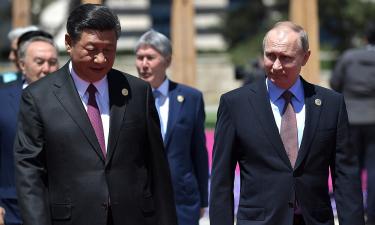Russian deputies crack down on beer advertising again
 New amendments impose very tough restrictions on the advertising of beer
New amendments impose very tough restrictions on the advertising of beer
The State Duma gave the third reading to amendments to the Federal law “About the Advertising.” Originally, amendments touched upon only the beer advertising. However, according to the latest variant, the advertising of all other alcohol drinks stronger than 0.5 percent will be restricted as well. The new law touches upon the advertising of not only alcohol, but also soft drinks like the traditional Russian drink known as kvas, or the yoghurt drink kefir.
The advertising of the above-mentioned drinks will not be allowed on television from 7 a.m. till 10 p.m. In addition, beer adverts are not supposed to make people think beer is a good way to get rid of the thirst. There is a certain list of organizations, in which the advertising of beer and soft alcohol drinks is not allowed. The list includes medical, educational, children’s and sports organizations. To crown it all, advertising on television can not be designed in the form of cartoons.
An attempt to categorize beer as an alcohol drink contradicts to all international norms. According to the global classification of goods and services, ‘alcohol drinks’ and ‘beer’ are referred to different classes. If beer is an alcohol product, Russia will have to reconsider several international agreements.
Amendments to the federal law “About the Advertising” shocked market members. “The last variant of amendments is a lot tougher in comparison with previous ones. It totally prohibits the advertising of beer. These are the toughest measures in Europe,” deputy CEO of the Union of Russian Brewers Alexander Troitsky said.
The analysis of amendments makes it clear: Russian law-makers are intended to impose more restrictions on beer producers than on vodka and tobacco manufacturers. Health-detrimental goods are equalized with the products, the good of which is not disputed (kefir, for example). It brings up an idea about the activities of vodka lobbyists in the Duma. This proposition can be backed up with recent statements from the renowned Russian politician Vladimir Zhirinovsky. About three weeks ago Zhirinovsky said a “beer coup” would be inevitable unless deputies restricted the beer advertising. “Beer is a very bad drink. It makes people put on weight, it is very bad to liver, it makes people dumb. Vodka is less dangerous, although it is definitely a stronger drink,” Zhirinovsky said.
New amendments prohibit the use of people, animals and their images in the advertising of beer. This wording obviously needs more explanation, because it is not clear, if contoured living beings, their audio-images, or shades are allowed. If the law comes into effect, beer-makers will have to change the design of their labels too, because some of them depict images of animals and people. Brewing companies would be forced to change their production and commercial strategies, which requires a lot of costs. An attempt to interfere into the self-regulated system of the advertising market does not bring anything good. The state simply interferes in market relations regulated with their own laws.
Law-makers’ restrictions, most likely, will not exert a strong influence on the consumption of beer. Recent research conducted in the USA, Great Britain, France and Sweden has not found a correlation between the general volume of advertising and consumption. Beer advertising costs in Great Britain gained 58 percent over 12 years, although the consumption level dropped by 17 percent. Brewing companies say new amendments will force them to reject sponsorship activities, particularly in sports.
Vodka does not need any advertising in Russia, although one can see its presence on television anyway: mineral waters, coffee, or chocolates are advertised under vodka brands daily. If beer disappears from television as a competitor to vodka, the consumption of vodka will considerably grow.
The advertising of beer products takes about ten percent of television advertisements in up-to-date Russia. Specialists say, social factors, prices and the purchasing capacity of the population exert the strongest influence on the consumption of beer, not the advertising and its content. Apparently, Russian law-makers are not concerned with the nation’s health.
Subscribe to Pravda.Ru Telegram channel, Facebook, RSS!




